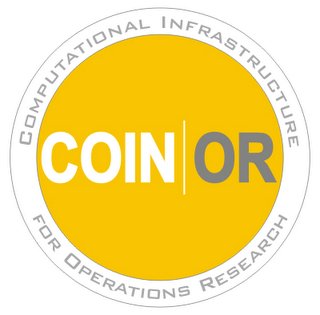I am attending a conference at DIMACS on COIN-OR, which is an activity to encourage and support open source development in operations research. At the moment, most of COIN-OR revolves around linear and integer programming codes, but there are efforts in nonlinear programming, metaheuristics, and other areas.
COIN-OR addresses one of my pet peeves about research in OR (including my own!): developed codes are very rarely available and even more rarely useable by others. So people either reinvent previous work or simply compare new results to old results (perhaps trying to correct for computer speed). COIN-OR tries to develop a repository of open source codes. So, for instance, if you are doing research on a new type of cut for integer programming, you can simply add a short code to a full-featured IP code and see the results.
The codes being developed are very impressive, though a little overwhelming for a casual user. But different people are working for different target audiences. I hope the audience “I want to put together a branch-and-price algorithm in an afternoon” (e.g. me!) is addressed a bit more in the future.
One of the key goals for COIN-OR is highlighted on the home page:
Our goal is to create for mathematical software what the open literature is for mathematical theory.
If we are to advance as a field, we need much, much more of this sort of effort.
COIN-OR is an example of a strong community in our field. It is great watching people who have only emailed over the past years meet each other for the first time.
And in breaking news, COIN-OR has chosen a new logo, as illustrated here.
For someone who has only recently discovered the joy of mathematics from an intro course in discrete math – and rather late in life I might add – this is a wonderful way for someone like myself to get deep down into understanding some of this stuff.